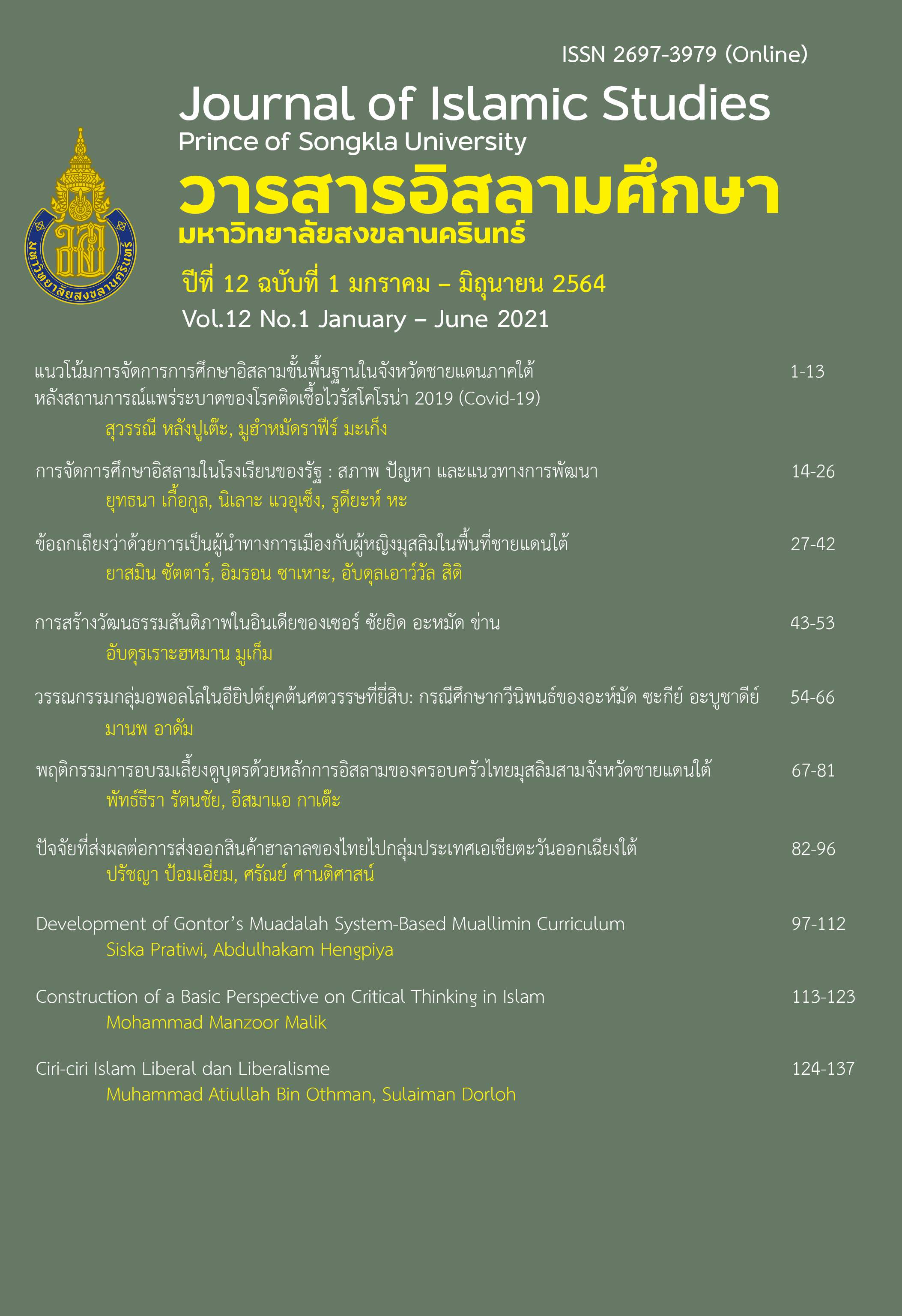Trends of Basic Islamic Educational Management in Southern Thailand after the Pandemic Covid-19
Keywords:
Trends, Islamic education management, The Pandemic Covid-19Abstract
Objective This research aimed at presenting trends of basic Islamic educational management in Southern Thailand after the breakout of Pandemic Covid-19 by using qualitative approach.
Methodology Data were collected by in-depth interview through 15 key informants which consist of 3 administrators, 6 teachers and 6 parents from Pattani, Yala and Narathiwat who were purposely selected based on criterion. The data then were content analyzed.
Research Findings The results revealed that the management of Basic Islamic education need to be adjusted by covering educational policies during the Pandemic Covid-19 to several aspects related to the quality of education which are in line with the trend of basic Islamic educational management after the pandemic covid-19. They are 1) educational policies, 2) appropriate environment for new learning activities, 3) curriculum, textbooks, and teaching materials development, 4) teacher training, 5) pedagogy, and 6) new evaluation for basic Islamic educational management in the pandemic Covid-19 situation.
Applications As a guideline for educational administrators, teachers, students, parents, educational personnel, and the public involved in educational management to adjust the format and methods of education management in the future after the pandemic of the Coronavirus 2019 (Covid-19).
References
Athikiat, K. and Sarthueankaew, T. (2007). kānsō̜n bǣp thansamai læ theknik withī sō̜n nǣo mai. [Modern teaching and innovative teaching techniques]. Retrieved 29 March 2021 from https://regis.skru.ac.th/RegisWeb/webpage/addnews/data/2017-07-24_078.pdf
Bunnamudom, P. (2020). hō̜ng rīan nai fan khō̜ng kānsưksā satawat thī yīsipʻet: botbāt samkhan khō̜ng hō̜ng rīan nai kān songsœ̄m kānrīanrū nai lōk samai mai. [Dream classroom in 21st century education: the role of classroom in Promoting in the New World]. Retrieved 28 January 2021 from https://www.educathai.com/knowledge/articles/123
House of Senate Education Standing Committee (2020). Khō̜sanœ̄ chœ̄ng nayōbāi rēngdūan wādūai kānbō̜rihān čhatkān sưksā ʻēkkachon nai chūang sathānakān kān rabāt khō̜ng rōk titchư̄a wairat khōrōnā sō̜ngphansipkāo (covid-19) thī mo̜som kap sangkhom Thai. [Urgent appropriate Policy recommendation on Private Education management in the Pandemic Covid-19 for Thai Society]. Bangkok: Office of Standing Committee 3, Office of House of Senate Secretary.
Jantharakantee, A. (2014). The Development of Pre-Service Science Teachers’ Attitude about Teacher Characteristics by Using Case Study of Teacher Somporn who Teaches Monkeys. Silpakorn University Journal, 34(1), 161-179.
Khemmanee, T. (2010). Sāt kānsō̜n: ʻongkhwāmrū phư̄a kānčhat krabūankān rīanrū thī mī prasitthiphāp. [Teaching Science: Knowledge for Effective learning Process]. Chulalongkorn University Publisher.
Kumsuprom, S. (2020 May, 5). phœ̄i kān rīankān sō̜n rabop ʻō̜nlai chalui hēt dek keng theknōlōyī. [Revealing the qualitative online teaching system Why kids are good at technology]. Retrieved 22 December 2020 from https://www.thaipost.net/main/detail/65137
Ministry of Education. (2020). Nǣothāng kānčhatkān rīan kānsō̜n khō̜ng rōngrīan sangkat samnakngān khana kammakān kānsưksā naphư̄n thān nai sathānakān kān phrǣ rabāt khō̜ng rōk titchư̄a wairat khōrōnā sō̜ngphansipkāo (COVID - 19) pīkānsưksā 2563. [Teaching management approaches in schools under the Office of the Basic Education Commission in the Pandemic Covid-19 for academic year 2020]. Office of the Basic Education Commission.
Pinyosinwatt, P. (2020, May, 7). čhatkān rīan kānsō̜n yāngrai nai sathānakān khō wit -19: čhāk botrīan tāngprathēt sū kānčhatkān rīanrū khō̜ng Thai [How to manage teaching and learning in the Pandemic Covid-19: Lesson learn from abroad to Thai learning management]. Retrieved 16 December 2020 from https://tdri.or.th/2020/05/examples-of-teaching-and-learning-in-covid-19-pandemic/
Prachāchāt online. (2020, June, 16). Globish phœ̄i sī new normal nǣothāng kānsưksā Thai [Globish declared four New Normal Thai Educational Approaches]. Retrieved 28 December 2020 from https://www.prachachat.net/education/news-478376
Sittisamarn, S. (2020, July, 1). Rīan bǣp New Normal kō̜ tō̜ng plīan withī pramœ̄n dūai [New Normal Learning style must change evaluation method too]. Retrieved 19 November 2020 from https://mgronline.com/qol/detail/9630000067379
Tongkaew, T. (2020). New Normal Based Design in Education: Impact of COVID-19. Journal of Teacher Professional Development, 1(2), 1-10.
Wongyai. V. and Pattapol, M. (2020). Kānpramœ̄n kānrīanrū New normal. [Learning Assessment in New Normal]. Postgraduate Srinakharinwirot University.
Wongyai. V. and Pattapol, M. (2020). New normal thāngkān rīanrū [Learning in New normal]. Postgraduate Srinakharinwirot University.
Downloads
Published
How to Cite
Issue
Section
License
Copyright (c) 2021 Journal of Islamic Studies, Prince of Songkla University

This work is licensed under a Creative Commons Attribution 4.0 International License.
All articles Published in The Journal of Islamic Studies are author’s opinions, and not the responsibility of the Faculty of Islamic Sciences nor the editorial board. However any citation should be referred to the journal.
















